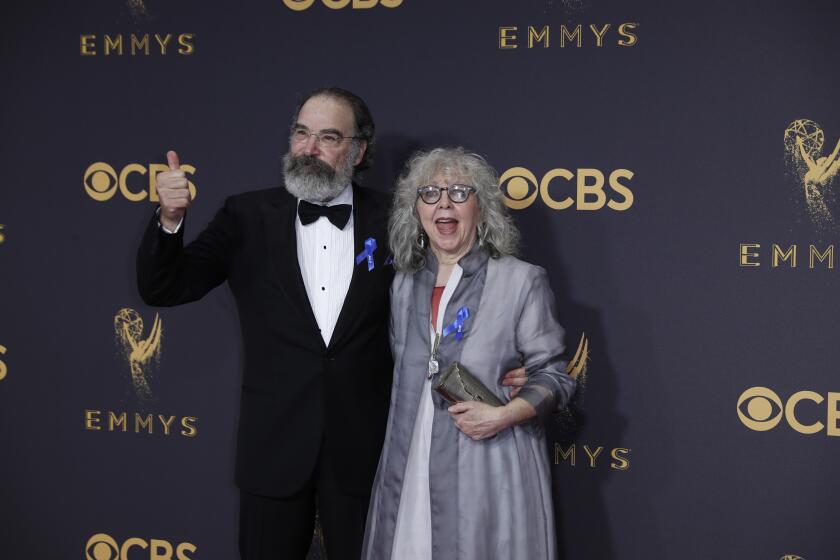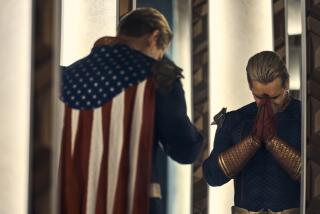In its eight seasons, ‘Homeland’ reflected ‘dizzying and sobering’ real-world issues
No season of “Homeland” could begin without a trip to spy camp.
Annually, actors, producers and writers for the Showtime series assembled at a “spook club” in Washington, D.C., spending a dozen hours a day over the course of a week with policymakers, journalists and intelligence service reps to uncover nuanced, up-to-date answers to one specific question: What’s going on between the U.S. and the rest of the world?
And based on what they learned, “Homeland” could begin a new season.
“Dizzying and sobering” is how Claire Danes, who starred as lead operative Carrie Mathison for the full run of the series, which wrapped its eighth and final season in April, characterized the meetings. “It was a lot to synthesize. Sure, we indulge in poetic license, but [stories] always came from a well-informed, well-researched place.”

Trailer for the eighth and final season of Showtime’s “Homeland.”
During its eight seasons, “Homeland” was always more about posing questions than offering solutions. Early on, its quirks made it stand out — a multi-seasonal arc about a kidnapped American soldier who’d been “turned” by his Islamist captors; a tough and determined CIA operative protagonist both driven and tormented by bipolarism; an imperfect but wise veteran mentor who always had her back. But as the show unfurled, “Homeland” evolved into a mirror held up to a post-9/11 United States struggling with an identity crisis.
And it was a natural outgrowth of another TV series: “24.” That series had a protagonist who fixed the world by blasting through it, while “Homeland” focused on the intelligence side of diplomacy and spycraft, says Mandy Patinkin, who played Carrie’s mentor, Saul Berenson. “One of the great aspects of ‘Homeland’s’ nature is that it defined the lost art of listening,” he says. “It was about information. We’re living in a world where people aren’t listening to each other anymore. It’s an existential threat.”
Mandy Patinkin and wife Kathryn Grody display pop culture cluelessness and enviable marital togetherness in videos that make you crave matzo.
But “24” wasn’t just a reference point for “Homeland”; it’s baked into the behind-the-scenes DNA. Though the original idea was based on an Israeli series called “Prisoners of War,” “24” executive producer Howard Gordon co-created “Homeland” with his longtime collaborator Alex Gansa, who was its showrunner and had also worked on “24’s” later seasons. As the original iteration of “24” wrapped in 2010, the pair began looking for a place to house their next show — something taking place 10 years after 9/11 — and focusing on a CIA agent.
Gansa and Gordon had a friend in the (then) newly elevated Showtime President of Entertainment (now Chairman and Chief Executive) David Nevins, who had greenlighted “24” while at Fox, and the pair’s new spec script caught his attention. “This was a chance to do a deep dive into damaged psyches that we were known for, like ‘Dexter’ and ‘Nurse Jackie,’ but set against a commercial spy thriller with propulsive storytelling,” says Showtime Co-President Gary Levine, who was in on the development of that script.
How does Israeli TV translate to U.S. audiences? Very well
And the script needed some assistance: Though Danes was already in mind to play Carrie (the character’s original name was Claire), the character’s bipolarism wasn’t yet part of the story. “That was a studio note,” says Danes. “A really good one. It’s risky to tack on pathology to a character — you don’t want it used as a convenient device for plot purposes. But they took it seriously and honored the complexity of it.”
The show took off in its first season and won the network its first (and so far only) Emmy for drama series in 2012. “‘Homeland’ was like the booster rocket that took [Showtime] out of the good orbit we were on and blasted us to a whole other plain,” says Levine.
The network partnership was mutual; in addition to the suggestion of adding Carrie’s psychological challenges, Gordon says Nevins advised them to let the series go at its own pace. “They gave us the opportunity to tell our story and slow it down,” he says. “David encouraged us to open it up and let that dynamic breathe and take its time.”
In the process, “Homeland” told stories that drew fire from both ends of the political spectrum, which Gansa counts as a victory. “When you’re attacked from the left for being Islamophobic and attacked from the right for being soft on terrorism, you’re being successful in your narrative attempts,” he says. “We always tried in a rigorous way to put ourselves in our characters’ shoes.”
That ambiguity became one of the series’ core strengths; no story was ever tied up in a neat bow, favorite characters were regularly killed off, and even its lead refused to buckle under expectations. Not only did Mathison struggle with her illness but she also became a mother, ultimately ceding guardianship of her daughter to her sister. (During the show’s run, Danes became a mother of two herself.)
“The best ‘Homeland’ scenes were two people with completely opposing views who’re both correct,” says director and executive producer Lesli Linka Glatter. “The show asks such provocative questions. You might not deliver answers, but you’re constantly looking at the world and asking those questions.”
Which was how every season began, at spy camp: with a question that fractured into dozens, if not hundreds more.
“The show’s been an aperture on the crazy world we’re living in, hopefully,” says Gordon. “People have said to me that the show helped them understand the world differently. Maybe it made people think about their lives and responsibilities as Americans and global citizens. That’s as nice a thing as you can hope to hear.”

<p>Claire Danes discusses showing Carrie as an unloving mother and the bathtub scene</p>
More to Read
The complete guide to home viewing
Get Screen Gab for everything about the TV shows and streaming movies everyone’s talking about.
You may occasionally receive promotional content from the Los Angeles Times.







